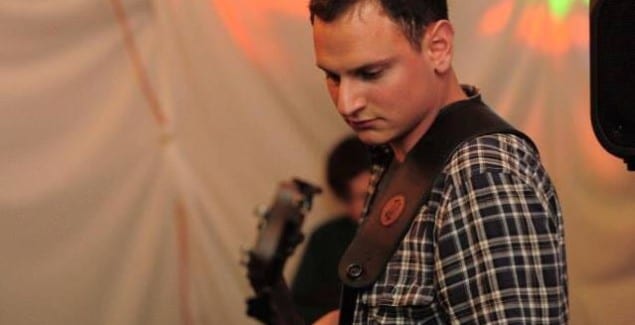Meeting The Challenges Of Tourette’s Disorder: Dan’s Story

Posted in: Grade School, Teenagers, You & Your Family, Young Adults
Topics: Mental Illness + Psychiatric Disorders, Real Lives Real Stories
This blog post is part of a series entitled Real Lives, Real Stories: Personal Experiences With Mental Illness.
Note: The following person’s account of his/her personal experience has been published with his/her consent to support the mission of The Clay Center for Young Healthy Minds, and let others in similar situations not feel so alone.
Introduction
Gene Beresin, M.D.
Many of us have likely seen the film Austin Powers in Goldmember, the third in the Austin Powers series.
In one particularly hilarious moment, Austin Powers meets Number 3, played by Fred Savage (whom you’ll probably recognize as Kevin Arnold from The Wonder Years). Number 3 greets Powers, noting that he is a mole for British Intelligence who is currently working undercover in Dr. Evil’s organization. Ironically, this mole happens to have an unmistakably large mole on his face (obviously something one would not expect from a secret agent whose entire prerogative is to blend in).
But this is a really large mole.
Naturally, Powers cannot help but gawk at it, blurting out “mole” and “moley, moley, moley” repeatedly to everyone’s shock and disbelief. He just can’t stop himself.
The reason this scene cracks us up is because it’s completely outrageous and obnoxious. It makes us laugh because it’s terribly uncomfortable for all, and particularly for Number 3. Powers is out of control.
Now, imagine that you’re in grade school, and that there’s something about you that is so obvious, other kids can’t help but notice it, question it, and, sadly, make fun of it. We’re all terribly self-conscious at this age, wanting more than anything to fit in with our peers. That’s hard enough as it is, but it’s even harder for kids who have Tourette’s disorder, which is characterized by uncontrollable “tics,” or sudden, non-rhythmic movements and/or vocalizations that appear to worsen with stress.
Such was the case for Dan Greenberg, who developed Tourette’s in fourth grade. His narrative below is an inspiration to us all—a young man who bore the challenge of living with a disability he could not hide, ultimately learning to cope with and overcome a condition many of us can hardly fathom.
Here is his story.
(Note: We begin from the perspective of a high school junior, and then flash back to that of a grade-schooler).
***
What Makes Me Tic:
Meeting the Challenges of Tourette’s Disorder
Dan Greenberg
Looking out at the crowd, I knew the whole school was watching me. I slowly began playing on my bass the Bach piece I had worked on for the past year, trying to focus my concentration. I wondered to myself how I had gotten here; a junior at Noble and Greenough, one of the best independent schools in Massachusetts, let alone the country, where I was at that very moment performing a piece I swore I could never learn in front of the entire school. To think: just four years earlier I was so sick, and my confidence so low, that I was unable to go to school for six weeks. Sitting on stage now, I knew with all of my heart that I could, in fact, accomplish anything.
***
I was half-way through my fourth grade year when it started. I don’t remember much, only that I started needing to crack my neck. I didn’t really understand it; all I knew was that I couldn’t stop it. It was like a mosquito bite that I needed to scratch. My parents took me to see a chiropractor who opined that one of my vertebrae was hitting a nerve. He fixed what he thought was the problem, but my need persisted. I just could not stop twitching. Eventually, my parents took me to my pediatrician, Dr. Geller. My parents had no clue what was happening with me, so when Dr. Geller explained to them that I had Tourette’s syndrome, they were relieved to be able to put a name to my symptoms. I could say that I was relieved as well, but I don’t think that would be accurate. Something strange and new was happening to me, and I didn’t have enough perspective to understand it. I don’t remember feeling upset, mad, relieved…anything, really. Now I know that Tourette’s is a neurological disorder that causes involuntary vocal and motor tics; all I knew then was that I had to tic—and that was that.
On bad days, nothing could stop my tics. I jerked my head all around hoping for my neck to crack; I needed it to. If it didn’t, I had to do it more. When I’d finally get a good crack, it would feel so good—better than Ben & Jerry’s ice cream on a hot day. In fact, the feeling was so great I needed to do it again. And again. And again. My parents tried to comfort me, but I hated for them to touch me while I ticked. I couldn’t take it. It was a feeling so strange, so uncomfortable, like touching a bad burn. No one could touch me while I ticked; I needed to do it alone.
It was even worse at school. There was no hiding from my tics; it was like I was wearing a giant sign that read, “Look at me! Make fun of me!” The younger kids especially couldn’t seem to leave me alone. Here I was, a fourth grader, and the first graders were making fun of me! Things did improve after a while, but there were always those few choice individuals…
For instance, it would be recess, and everyone would be outside on the playground. I’d be swinging and, naturally, twitching my neck. Just going up and down, up and down, up and down. After a while, I’d forget that I was even ticking. Then, out of nowhere, Troy Cooper would come by.
“Hey Danny!” he’d said. I’d keep swinging.
“Hey! Don’t pretend you don’t see me. I know you do! Hey, look at me!” and he would proceed to start jerking around his neck, mimicking me.
“Hey, look now!” and then he would stop twitching.
“If I can stop, why can’t you?!” I didn’t have an answer, so I’d just keep swinging, as I always did.
Troy wasn’t liked by most of the kids at school. I don’t think the teachers liked him much, either. But I guess he really didn’t like me.
I’d often wonder if I had a brother, if he would be like me. I wished I did. But I didn’t wish to meet strangers with tics. My parents wanted me to go to meetings with them, but I thought that would be weird. Having a brother with tics would be different, though. It would be cool. I would be cool.
***
Danny was taken to a number of doctors who tried all sorts of medications to manage his tics. This was never easy for him. He didn’t want to take meds; he felt it was unnatural, that he wouldn’t be himself on them. After all, he had gone into treatment initially feeling that he had no control over his body, and now he was being asked to give up what little control he had left.
To complicate matters further, he also began to develop symptoms of anxiety, attention deficit hyperactivity disorder (ADHD), and obsessive compulsive disorder (OCD).
I saw a seemingly never-ending succession of doctors as we found that few medications seemed to have any positive effect on me. Tourette’s is thought to be caused by an excess amount of dopamine in the body, but finding the proper cocktail is essentially a crapshoot. One can only mix and match medications, and hope to land on the right combination eventually. Most of the medicines I took were to treat my tics, but other problems began to arise from my Tourette’s as well. I started to get feelings of anxiety and OCD; for example, if I scratched myself on one side of my body, I’d also have to scratch myself on the other side in order to feel “even.” Everything needed to be ordered “just so.” I also started to tic more often, and in different ways. It got to a point where I couldn’t take it anymore. I’d wander around my home ticking my mouth, neck, and any number of other body parts, obsessing over the teasing I’d inevitably endure the next day at school.
***
When Danny was in seventh grade, his parents decided that his Tourette’s had become so disabling, that it was best to take him out of school. Danny was first homeschooled before insisting himself that he try a private school.
A new school would be a new start: a ‘Tabula Rasa.’ I remember my parents dropping me off on my first day; they didn’t want to leave me, but they were proud of me for taking the initiative to start over. It was at Hillside School [an all-boys school in Marlborough, Massachusetts] where I was reborn, so to speak. For the first time in years, I was making friends. I even made a best friend.
Gabe, who was short for his age, was a hyperactive drummer, and it was with him that I started playing in a band; we were infamous throughout the school for playing the song “Seven Nation Army” by “The White Stripes.” I felt that I could be myself at Hillside. I didn’t have to worry about acting weird, or ticking—after all, half the kids at Hillside were grappling with one medical condition or another.
I began to flourish. The academics came easily to me, which meant that I could contribute my spare time to helping fellow students. Many of my classmates had learning disabilities or ADHD, so I tutored a number of them in Spanish, math, and science after I finished my work. In class, if the teacher had to focus on helping one student, I’d step in to help another. But they helped me, too. It was around these kids that I learned what it was like not to care about what others thought of me, to just be myself. Through the help of my classmates, I truly found my way at Hillside. At the end of my eighth grade year, I had the choice to continue ninth grade there, or transfer to another school. I chose the latter. While I loved my time at Hillside, I didn’t feel that I was being challenged enough, and by then, it had served its purpose in giving me a fresh start and renewed confidence. So, I applied to eight different schools, and was eventually accepted by one that gave me all of the challenges I was looking for—and then some.
***
My first months at Noble and Greenough were a living hell. I wasn’t prepared at all for the workload that was thrown at me. I wrote more essays in the first month at Nobles than I did in my entire time at Hillside, and basically taught myself the Algebra II that was nothing more than a review for my classmates. This constant stress did a number on my tics. I tried to hide them to the best of my ability, but it wasn’t much use. As a result, I kept to myself in the beginning, hanging out in my room at the dorms, and choosing not to socialize with the kids at school. Eventually, however, I started to gain back my momentum. It was a struggle, but somehow, I found my groove. Through a lot of hard work and extra tutoring, I found my way into the Nobles curriculum and community.
My sophomore year was the turning point in my Nobles career. For the first time, I was getting grades that I was proud of. My confidence grew, and I forged closer friendships. Incidentally, this was also a great year as far as my tics were concerned. They were the lowest they had been in a while—as were my meds. It was also around this time that my bass teacher introduced me to the Bach piece. He began by telling me the story of why it had been written in the first place: that a prince who played the cello was frustrated that no solo music has been written for his instrument, and thus, being a prince, commissioned Bach to write the suites for him. My teacher then showed me the sheet music, and said that he thought I could learn to play it. Looking down at all of the sixteenth notes, I thought he was crazy. For months, all I knew were the first eight measures. However, sometime over the summer, I picked the song back up again. I practiced almost every day until I had it down. When the new school year started, I continued with my lessons, and soon got to a point where I had the song memorized. I even fell asleep playing the song in my head. Finally, I worked up the confidence to ask Mr. Bussey for time at the upcoming school assembly.
***
Which brings us back to the beginning of my story. So there I was, off to the side of the stage, waiting 15 agonizing minutes for my turn. When the emcee finally called my name, I slowly walked on to the stage, introduced my song, and began playing.
The notes on my bass flowed out from me, almost without thought. I barely heard the faint ring of a cell phone disturbing the peace; my concentration was at such a level that I continued Bach’s Prelude in G without missing a beat. I successfully made it past the part where I always screwed up, and worked my way toward the final crescendo. My fingers made their way up the fret-board, finishing the song with a major triad. I was done. I could tell my classmates and teachers had enjoyed it, as their applause lasted longer than usual. I awkwardly took a bow, and then walked off stage to soak it all in.
***
In a meeting I had with my school advisor senior year, we discussed my experience at Nobles. He asked me about my friends, my classes, my extracurricular activities, etc., eventually generalizing his many questions into one: “What makes you tic?” I started to laugh, seeing that he didn’t yet realize the pun he had unintentionally created. I’m glad he did though, because I had found myself thinking the same thing. What DOES make me tic? What makes Danny, DANNY? Is it the Tourette’s, or my love of music, tennis, and knowledge? Is it my social awkwardness, or the fact that I was courageous enough to perform in front of the entire student body? These were questions I continued to ask myself as I looked forward to my future.
Conclusion
Gene Beresin, M.D.
Upon graduating from high school, Dan continued to flourish, despite, in his words, “feeling socially awkward and weird.”
Dan has since graduated from Northwestern University with a master’s degree in engineering design and innovation; he currently works in Chicago as a product development engineer. He has an active social life, continues to play music, and has learned to live with his challenges, now mostly ADHD and OCD.
Dan, perhaps more than most of us, understands what makes him tic.

 Share
Share Tweet
Tweet






